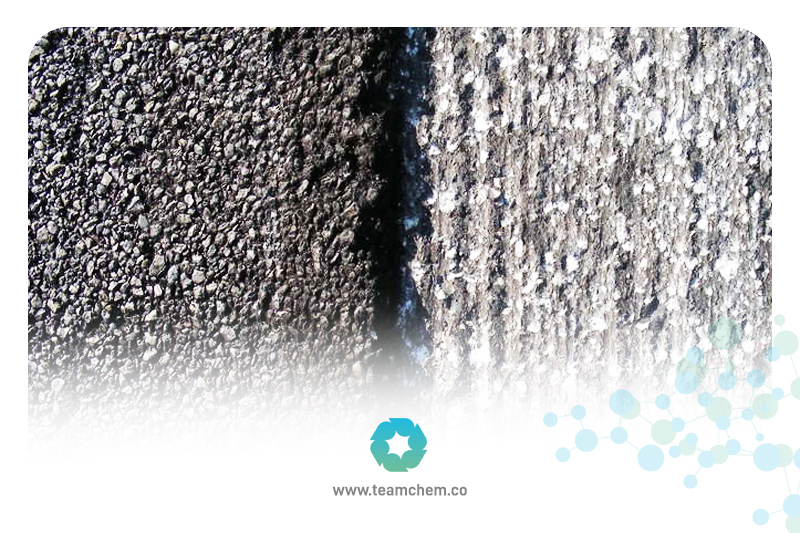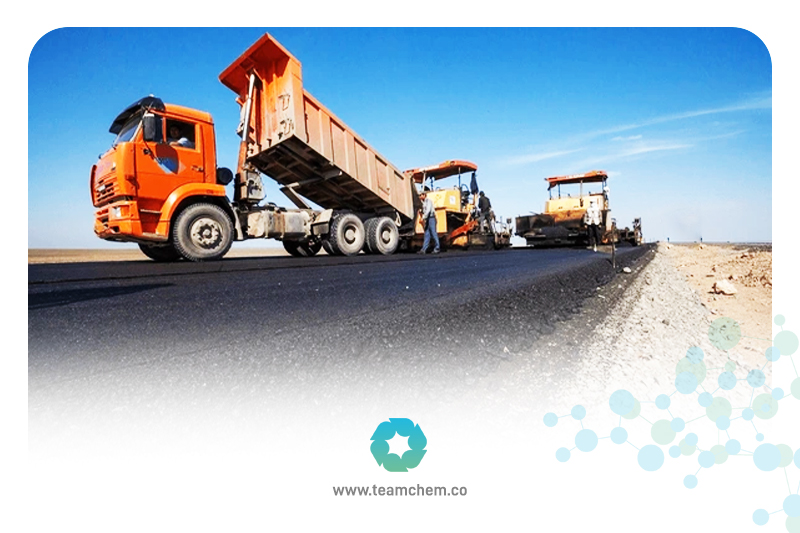What is Asphalt Binder? Team Chemicals Explains
Asphalt binder, also known as asphalt cement, is the glue that binds together the aggregates in asphalt pavement. This sticky, black substance is derived from crude oil through a refining process, leaving behind a concentrated residue perfect for binding aggregates like sand, gravel, crushed stone, and Gilsonite. The result is a smooth, durable surface capable of withstanding the heavy traffic and varying weather conditions typical of modern roads and highways.
History of Asphalt Binder
The use of asphalt dates back thousands of years, with ancient civilizations like the Babylonians and Egyptians utilizing natural bitumen for various purposes, including waterproofing boats, sealing buildings, and even embalming mummies. However, it wasn't until the 19th century that asphalt binder emerged as a key component in modern road construction. Its durability, cost-effectiveness, and versatility quickly made it the most widely used paving material in the world.
Asphalt Binder Types

Just like there are different types of glue for various projects (duh!), asphalt binders come in a variety of forms, each suited for specific road construction needs:
Petroleum Asphalt
Derived from crude oil refining, petroleum asphalt is the most common type of binder used worldwide.
It's classified into different grades based on its penetration (hardness) and performance grade (PG) specifications, indicating its resistance to high and low temperatures, traffic loads, and aging.
Common performance grades include PG 64-22 (suitable for warmer climates) and PG 58-28 (better for colder regions).
Natural asphalt, also known as bitumen, is found in naturally occurring deposits like the famous La Brea Tar Pits in urban Los Angeles, California.
While it has historical significance and some niche applications (e.g., roofing), natural asphalt is less refined and less commonly used in modern road construction compared to petroleum asphalt.
Its availability is limited, making it a less practical choice for large-scale projects.
Modified Asphalt
Modified asphalt binders are enhanced with polymers, rubber, or other additives to improve specific properties. TEAMChem provides expert guidance on selecting the right modified asphalt binder for your project, ensuring optimal performance and longevity.
Common modifiers include styrene-butadiene-styrene (SBS) and ethylene-vinyl acetate (EVA), which increase flexibility and resistance to cracking.
Crumb rubber from recycled tires is also a popular modifier, enhancing durability and reducing road noise.
Modified asphalts are often preferred for high-traffic roads, extreme climates, or where specific performance characteristics are required.
Asphalt Binder Composition
Understanding the composition of asphalt binder is key to appreciating how it delivers the strength, flexibility, and durability needed for modern roads. It is a complex mixture of hydrocarbons, primarily consisting of asphaltenes, resins, and oils.
Asphaltenes: These large, complex molecules provide the binder's strength and stiffness.
Resins: These smaller molecules act as dispersants for the asphaltenes, providing flexibility and adhesive properties.
Oils: These light components contribute to the binder's viscosity and workability.
As mentioned earlier, various modifiers and additives can be incorporated to tailor the binder's properties, including Gilsonite:
Polymers: Improve flexibility, elasticity, and resistance to cracking.
Crumb Rubber: Enhances durability, skid resistance, and noise reduction.
Gilsonite: A natural bitumen that enhances the performance and durability.
Fibers: Increase tensile strength and resistance to rutting.
TEAMChem, a leading supplier of specialty chemicals, offers a wide range of asphalt binder solutions, including high-quality Gilsonite, designed to optimize these crucial properties.
Beyond the Road: Asphalt Binder's Other Applications

While asphalt binder is synonymous with road construction, its versatility extends far beyond paving our highways and byways.
Roofing: Asphalt shingles and roll roofing are popular choices for residential and commercial buildings due to their affordability, durability, and waterproofing capabilities.
Waterproofing: Asphalt-based coatings and membranes are used to protect foundations, basements, and other structures from moisture damage.
Sealants: Asphalt-based sealants are used to fill cracks and joints in pavements, concrete structures, and other surfaces to prevent water infiltration and deterioration.
Industrial Applications: Asphalt binder is also used in the production of various industrial products, such as pipe coatings, adhesives, mastics, and insulation materials.
The Essential Properties of Asphalt Binder
Asphalt binder isn't just a sticky substance; it's a carefully engineered material with properties that directly impact the quality and longevity of our roads. Understanding these key properties is crucial for pavement engineers and anyone interested in the science behind smooth, safe roadways.
Viscosity
Viscosity refers to the binder's resistance to flow, which changes with temperature. Proper viscosity is essential for workability during construction and for ensuring the binder adequately coats aggregates.
Durability
A binder's durability determines how well it resists aging, oxidation, and environmental stressors like sunlight, rain, and temperature extremes. Durable binders lead to longer-lasting pavements, reducing the need for costly maintenance and repairs.
Flexibility
Flexibility is key, especially in regions with large temperature swings. A flexible binder can expand and contract without cracking, preventing potholes and other forms of pavement distress.
Adhesion
Strong adhesion between the binder and aggregates is crucial for pavement integrity. Good adhesion prevents the binder from stripping away from the aggregates, which can lead to raveling and other forms of deterioration.
The Sustainable Path Forward
As the world focuses on sustainability, the asphalt industry is also stepping up to address environmental concerns associated with asphalt binder production and use. Traditional asphalt binder production relies on fossil fuels, contributing to greenhouse gas emissions. The industry is actively researching and implementing cleaner production methods, such as using renewable energy sources and optimizing refining processes.
Warm-Mix Asphalt: This innovative technology allows asphalt to be produced and laid at lower temperatures, reducing energy consumption and emissions during production and construction.
Recycled Asphalt Pavement (RAP): Reusing reclaimed asphalt pavement (RAP) in new asphalt mixes conserves resources, reduces the need for virgin materials, and diverts waste from landfills.
Bio-Based Binders: Research is ongoing into developing asphalt binders from renewable sources like vegetable oils and lignin, potentially reducing the industry's reliance on petroleum.
Future Trends in Asphalt Binder Technology
The world of asphalt binder is constantly evolving, with exciting innovations on the horizon that promise to revolutionize the way we build and maintain our roads.
Smart Binders: Researchers are developing asphalt binders with self-healing capabilities, allowing them to repair minor cracks and damage autonomously, extending pavement life and reducing maintenance needs.
Adaptable Binders: These binders can change their properties in response to environmental conditions, such as temperature or moisture, optimizing performance and durability in different climates.
Performance-Enhanced Binders: New additives and modifiers are being developed to further enhance binder properties, such as increased resistance to rutting, cracking, and moisture damage, leading to longer-lasting pavements.
Data-Driven Design: The use of big data and advanced analytics is allowing engineers to optimize mix designs and predict pavement performance more accurately, leading to more efficient and cost-effective road construction.
It's important to note that these emerging trends in asphalt binder technology are not just about building better roads; they're about creating a more sustainable, resilient, and efficient transportation infrastructure for the future.
Asphalt Binder Price
Historically, asphalt binder prices have been volatile, experiencing both sharp increases and declines. In recent years, global events like supply chain disruptions, geopolitical tensions, and economic fluctuations have only amplified these price swings. Understanding the factors that drive the price of binders can help contractors and decision-makers budget effectively for paving projects. These factors include:
Crude Oil Prices:
As a petroleum-based product, asphalt binder's price is directly tied to the global price of crude oil. Fluctuations in oil markets have a cascading effect on the cost of refining and producing asphalt binder.
Refining Processes and Costs:
Refineries that utilize more advanced technologies or have higher operating costs may produce a more expensive product.
Transportation and Logistics:
The distance between the refinery and the construction site plays a role in the final cost. Transportation expenses, including fuel and labor, contribute to the overall price.

Regional Demand and Supply:
Areas with high demand for asphalt binder, such as rapidly growing regions with extensive road construction projects, may experience higher prices due to increased competition for supply. TEAMChem's strategic partnerships and global sourcing capabilities help mitigate these fluctuations, ensuring competitive pricing for our customers.
Team Chemicals: Your Trusted Source for Asphalt Binder
Facing challenges with your asphalt binder supply chain? TEAMChem is your partner for reliable, high-quality specialty chemicals. Our expertise in sourcing and logistics ensures you get the right products, at the right time, every time. Let's discuss how we can optimize your operations. Contact us today for a free consultation.